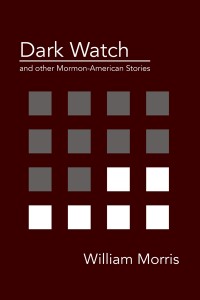What all (or nearly all) of these stories have in common is that they are concerned with what it means to be Mormon and, in particular, the tension between the requirements of Mormon faith and competing identities and demands, whether of the academic world, middle school social hierarchy, or a post-apocalyptic “confederation” where Mormon belief must be explicitly renounced. All of the stories are about liminal experiences—except that the focus is not on moving into or out of Mormonism but on maintaining a sometimes-precarious position of holding on to both identities.
I’m a bit embarrassed to admit this—and it would make a terrible advertising angle—but the word that spoke loudest to me in that passage was liminal. But that’s exactly right. Dark Watch is story after story after story about how being Mormon is being between. Between middle-school cool and YM/YW righteous, between academic hobnobbing and lifelong moral boundaries, between, if you like, Babylon and Zion.
Many of the pieces included here are bitesize (in part because some of them first appeared as part of Mormon Lit Blitz—see The Elder Who Wouldn’t Stop, The ReActivator, and Release) which appropriately allows them to fit between the moments of our own lives, into the nooks and crannies we intend to devote to art.
Morris has boldly subtitled his collection Mormon-American stories, daring anyone to use that as an excuse to reject him. And people will, of course, because a prophet hath no honour in his own country and no one is more swift to reject Mormon artists than Mormon who, like, really appreciate good art.
But I’m not here to judge you. I’m here to judge the art. Going back to those linked-to short-shorts, let’s contrast “The Reactivator” and “Release” as works exploring the liminal. Briefly. I know you have better things to do than learn what there is for man to enjoy.
“The ReActivator” is about a night out with an overzealous elders quorum president and his first counselor who has “a hard time going after the lost sheep. In my experience, there’s a reason they’ve left the fold.”
But you’ll note I already tipped my hand. I typed overzealous as if over is the correct reading of the man’s enthusiasm. And so I, like the narrator, will sit through an amazing experience only to “[share] his joy. And [mourn] my inability to share it fully.”
Lord, I believe; help thou mine unbelief.
The story is perhaps too accurate in reflecting my own image.
“Release,” like 37.5% of the titles in Dark Watch, takes place in the future. This particular version of the future is so dystopian that members are only able to communicate with and care for each other through subliminal communication done via pheromones and such. It’s a beautiful story set in a confusing and frightening world, and, after its positive vibes fade, it will leave you with a troubling set of questions about the natures of agency and faith.
If I had to pick favorites from the collection I probably wouldn’t choose either of these, but they are freely available and I believe that once you have partaken of them you will be desirous to partake of more.
Besides. Do you know what ol’ Brother Morris intends to do with your three dollars? He’ll use it to fund future projects like the soon-to-be-available States of Deseret, which features eight stories (some of which are pretty dang meta) exploring alternate Mormon histories.
(And by “fund” I mean “pay the writers.”)
So Dark Watch isn’t just stories about us. It itself is a story. Do we believe enough in our own voices to engage with and support our own art?
Or are we going to look severely over our reading glasses and just feed our souls Jonathan Lethem instead?


Thanks, Theric.
And for what it’s worth: all the contributors to States of Deseret have already been paid thanks to sales revenue from Dark Watch and other Mormon-American Stories. So thanks again to everyone who bought the book, although, of course, additional sales means even more future projects (plus ongoing help w/the costs for A Motley Vision).
.
Yeah, it’s kind of an old review…. I probably should have rewritten it a bit….